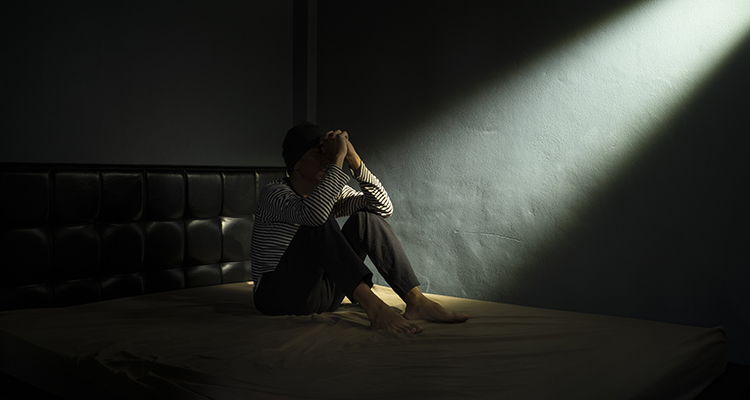Belsomra for Insomnia: How It Works and If It’s Right for You
With numerous sleep aids and medications on the market, it can be difficult to know which one’s best for your specific situation. Whether you’re facing chronic or acute insomnia or simply need relief for a single night, there are options. All sleep medications come with certain potential side effects and may interfere with other medications you’re currently taking.

Before you make a decision, it’s best to gather all the information and explore all your options. CBT for insomnia, mindfulness exercises, lifestyle changes, and other forms of therapy are all viable options for insomnia patients. But if you’re looking for added support, a sleep aid might help.
In this article, we’ll be taking a closer look at Belsomra – a popular sleeping pill for treating insomnia – including uses, dosage, and potential side effects.
Content
What is Belsomra?
Belsomra is a prescription medication for adults suffering from insomnia including trouble falling or staying asleep. Belsomra is the brand name of a drug called suvorexant. This drug is designed to enhance sleep and reduce the number of times users wake during the night. Most people start to feel drowsy shortly after taking Belsomra. One study shows that users taking Belsomra fell asleep 6 minutes faster and stayed asleep 16 minutes longer, making its effectiveness modest at best.

On a positive note, Belsomra is approved by the FDA (the U.S. Food and Drug Administration) as a viable way to promote sleep. Suvorexant is in a class of medications known as orexin antagonists. Orexin is a neurotransmitter in the brain that triggers wakefulness and plays an important role in regulating your circadian rhythm. Belsomra works to block the chemical messages sent by orexin, reducing alertness and enhancing drowsiness. Belsomra interacts directly with receptors OX1R and OX2R, suppressing your ability to stay awake. It’s interesting to note that a permanent loss of these cells can trigger narcolepsy in some people.
How to Take Belsomra
Belsomra is a pill available in 5mg, 10mg, or 15 mg. Depending on your type of insomnia, 5mg may be enough, while 10mg is the average dose for most patients. Because Belsomra is a prescription drug, users need to consult with their doctor or another healthcare professional before taking this medication. The doctor will ask you a series of questions to determine the proper dose for your condition. Be sure to tell your doctor about any other medications you’re taking, as they may not only interfere with the effectiveness of this sleep aid but could interact negatively.

Once you’ve determined the right dosage, the next step is knowing how and when to take it. You can take this medicine with or without food although taking it with food may slow down the effects. Most patients take Belsomra right about 30 minutes before going to bed. Avoid taking it when you’re overly alert or active. Instead, take it when you’re winding down for the evening. You can add this sleep aid to your nighttime routine of relaxing sleep habits like reading, writing in a journal, meditating, or taking a warm bath. Only take this medication when you know you can sleep for 7 hours or more. Avoid drinking alcohol when taking Belsomra or any other sleeping pill.
Belsomra Isn’t for Everyone
Like most other medications, this sleep aid may not be the best choice for everyone. Certain people shouldn’t take Belsomra or if you do, it should be done with extreme caution. People suffering from narcolepsy are not good candidates for this drug. Individuals with a history of mental illness including depression or suicidal thoughts should also avoid taking Belsomra. In addition to alcohol, don’t combine this medication with other drugs that suppress your respiratory or central nervous symptoms.

If you’re overweight or a woman, you may require a lower dose of this medicine. Individuals with preexisting liver or lung issues should also avoid taking Belsomra. Because women are already at higher risk of side effects from this sleep aid, it’s not recommended for pregnant women or women who are breastfeeding.
Potential Side Effects of Belsomra
In addition to the above-mentioned risk factors, if you’re considering Belsomra as a sleep aid, you should be aware of all potential side effects. These range from mild to more severe. The most common and obvious side effect of suvorexant is sleepiness. Some people report feeling groggy, confused, or “drugged”. It’s recommended you only use this sleep medication when you’re able to sleep for 7 straight hours or longer because the drowsy side effects can linger from the night into the next morning. This makes it difficult for some people to wake up, focus, and perform their daily tasks and responsibilities.

Other side effects include:
- Changes in behavior (aggressive behavior, confusion, memory loss, anxiety, or hallucinations)
- Increased depression or suicidal thoughts
- Leg weakness
- Impaired breathing
- Sleep paralysis
- Complex sleep-related behaviors including eating, driving, and sleep sex
On a more positive note, there’s no evidence that Belsomra creates a physical dependency. That means you aren’t required to wean off of the drug but should still speak with a medical professional before abruptly stopping use. It’s also extremely uncommon for users to exhibit withdrawal symptoms after no longer using Belsomra.
Lifestyle Changes that Accompany Sleep Aids
For those suffering chronic insomnia, there’s generally no “quick fix”. While taking a sleep medication like Belsomra, certain lifestyle changes can support and increase its effectiveness.

Create a Sleep Schedule
Belsomra works by interacting with neurotransmitters responsible for controlling wakefulness in patients. Your body’s circadian rhythm also plays an important role in how easily you fall asleep at night and wake up each morning. By setting a consistent sleep schedule that includes going to bed and waking up at the same time each day, you can help promote a healthy sleep-wake cycle and increase the effectiveness of Belsomra.
Adopt a Healthy Sleep Routine
We are creatures of habit. We like predictability and routine. By adopting a sleep routine that includes the same relaxing behaviors each night, you’re helping get your brain and body in a routine for sleep. Things like turning off the TV and your smartphone at 60 minutes before bed, meditating, or listening to soothing music can all trigger your brain that it’s time to unwind and prepare for sleep. You can also add taking Belsomra to your schedule. Take it 30 minutes before bed each night with a glass of water, a small snack, or chamomile tea. Before long, your mind will associate taking that pill with bedtime and sleep.
Eat Right and Exercise
Eating a well-balanced diet and getting plenty of physical activity are important for overall health and wellness. But they’re also beneficial for maintaining a healthy weight and preventing insomnia symptoms. Being overweight or obese can cause a list of health complications and sleeping disorders such as obstructive sleep apnea. It’s also a risk factor for taking Belsomra. By eating a variety of healthy foods and not eating too close to bedtime, you can promote a healthy weight and a restful night’s sleep.
Physical activity keeps your bones, muscles, and mind in shape. Exercise is said to reduce stress and improve your mood. This can improve depression and anxiety symptoms which are also risk factors when taking Belsomra. Individuals that exercise at least 30 minutes per day, especially in the morning, report sleeping better at night. Not only do they fall asleep faster but experience more restorative, deeper sleep.
Improve Your Sleep Quality and Your Quality of Life
Long-term sleep deprivation can cause a laundry list of negative side effects and health issues. If you’re struggling to achieve quality sleep, medications like Belsomra may help. Before taking any sleep aid, be sure to discuss options with your doctor. Be honest about your current health and any medications you’re taking.

Most insomnia symptoms are treated using a combination of therapies, lifestyle changes, and medication. At Somnus Therapy, we provide plenty of resources, information, and suggestions for improving your sleep habits and your overall quality of life.
Click here to start your journey toward blissful sleep today.














